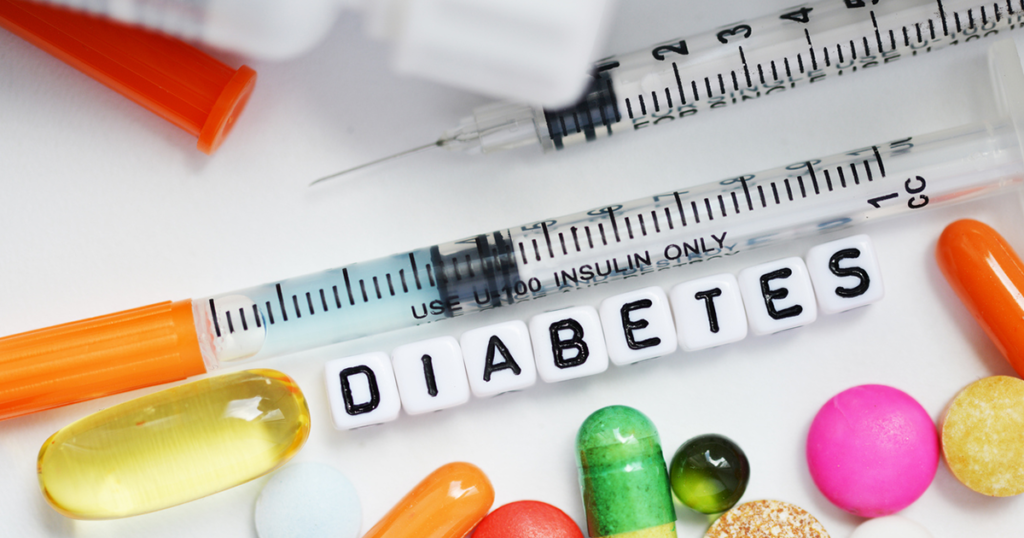Diabetes can lead to many complications including eye disease, nerve damage, heart disease, and several other debilitating conditions. Managing your diabetes is one of the most critical steps in living a longer and healthier life as a diabetic. By following a strict plan you can cut your chances of getting diabetic related eye disease by 75%, cut your chances of getting kidney disease by 50%, cut your chance of getting nerve disease by 65% and lessen the likelihood that any complications you have already developed will get worse. Here are 7 steps that can dramatically increase your overall health while living with diabetes.
Controlling and Planning your diet
The most obvious first step to managing your diabetes starts with your diet. Eat a balanced diet on a regular schedule and decrease your portions. You should try and make half of your meal consist of fruits and vegetables, one quarter should be protein and the remaining quarter a whole grain. Most people know to limit sugar intake, but it’s also important for diabetics to monitor carbohydrates which can cause your blood glucose to spike. The recommended amount of carbs for women is 35-45 grams per meal and 45-60 grams per meal for men. Most people do not get enough fiber in general, and it’s very important for controlling blood sugar. Fiber helps clear cholesterol building in blood and slows digestion which helps us feel satiated without raising blood glucose levels.
A healthy diet has several benefits that you will enjoy unrelated to your diabetes, such as increased energy, improved memory and sleep patterns and an overall better health. It is recommended that a diabetic patient have a dietician on their medical team to specifically tailor dietary recommendations and planning to their needs. Diet is the foundation of a good diabetes management plan. For more information on eating healthy meals, visit Choose My Plate, a nutrition and meal planning website operated by the USDA

Current nutrition guidelines suggest 50% vegetables & fruits, 25% protein and 25% whole grain.
Regular Excercise
Doctors recommend that you get 150 minutes of light-moderate intensity exercise per week. That comes out to 30 minutes a day 5 days per week. Even though the recommended goals are practical, a recent study conducted by the CDC found that only 1 in 5 adults gets the recommended amount of aerobic and strength training exercise. Regular exercise directly lowers blood sugar levels, helps stabilize those levels, and is an important component of any weight loss plan (you can decrease your chances of getting diabetes, or getting further complications by reducing your weight by just 10 pounds). You do not have to get your exercise in a gym; walking, jogging, biking, aerobics and dancing are all good forms of aerobic exercise.
Adults that exercise regularly enjoy improved mood and energy levels. For more information on exercise recommendations, nutrition and healthy lifestyle you can check out the President’s Council on Fitness.

The American Heart Association Recommendations for exercise.
Regular Testing and Checkups
Your Doctor has likely set up a schedule for testing your blood glucose, but additional information will help your doctor construct your treatment plan and will also help you make better decisions about your healthcare. You should spot check your blood sugar levels in addition to regular testing. Check during breakfast one day, right after lunch one day, during a slow activity period in the evening the next day. This will give you a fuller picture of how your blood glucose levels are reacting to your daily routine, and also to any lifestyle changes you may be making. You should also get your A1C checked regularly to find out if your overall risk for complications is improving or getting worse. Weigh yourself every week and set up a schedule for checking your blood pressure. Check your feet and ankles for cuts, sores and blisters and keep track of how long it takes them to heal completely. Keep all of your data organized in a notebook or spreadsheet; it is useless to measure if you do not record. You should also schedule yearly checkups for:
- Urine protein test
- Cholesterol test
- Foot exam
- Dental exam
- Blood screening
- Dilated eye exam
By keeping track of these stats it will paint a picture of progress, decline or stability over time. You will get a better idea about which treatments and therapies that your body reacts positively to, and your doctor will have more accurate information to assess your health. If you are unsure about where to go for specific testing, you could check CDC’s Health Resources and Services Locator.
Educate Yourself
We know a whole lot more about Diabetes today than we did even 20 years ago. Diabetes is preventable if you know the causes and risks, and you follow a healthy action plan to avoid habits that increase your risk. We also know more about managing diabetes, and we learn more everyday. Read as much as you can on the subject and become familiar with risks, treatments, management strategies, definitions and studies. Knowledge is the road map that will help you navigate your lifestyle as a diabetic.
As you will learn, successful diabetic treatment requires a team of several medical professionals and specialists. The most important member of that team is you, and ultimately you are the person that will make decisions about your healthcare and you will be the person that either follows or ignores Doctor’s recommendations.
There are many resources for information about Diabetes.
Draft a Better Team
Diabetes is a complex, chronic, whole body disease. You need a primary care physician that is either an expert on diabetes, or willing to learn for your sake. If you aren’t confident that your doctor is taking your diabetes as seriously as you are, you should look into finding someone who will.
In addition to your primary care physician, it is highly recommended that a patient with diabetes have several specialists on their team that are all in communication with each other. All of the team members should have input on your healthcare plan, and any time that one of your doctors or nurses objects or has a concern with an aspect of your treatment, a conference with your whole team present should be called to decide on the best course of action. Having multiple doctors and specialists will ensure that you aren’t neglecting an aspect of your treatment, and that each person is held accountable, and doesn’t overlook anything. Your team will consist of several of the following:
- Doctor
- Dentist
- Diabetes Specialist
- Dietitian / Nutritionist
- Eye Doctor
- Foot Doctor
- Pharmacist
- Diabetes Educator
- Mental Health Counselor
- Nurse
- Friends and Family
- Other Specialists as Required
Improve Your Dental Health
Diabetes puts you at an increased risk of peridontal disease and tooth decay (diabetics are twice as likely to develop gum disease). Infection and gum disease in turn elevates glucose levels, and the same bacteria that causes gum disease causes heart disease, which is a complication of diabetes. This is a vicious cycle that can be easily controlled by brushing a flossing.
Most people do not realize the connection between diabetes and their dental health. Always tell your dentist that you are diabetic, he may put you on a more vigorous schedule for visits, and at the very least will be able to monitor symptoms that are more prevalent among diabetics. He may also recommend different products for diabetics (most dentists would recommend Listerine for patients with gingivitis, but the increased alcohol content can aggravate dry mouth symptoms).
Just treating gum disease will help control glucose 10%-20%. Scientists and healthcare professionals are finding more correlations between dental health and the rest of your body every day. Prevention is key; since dry mouth is one of the primary diabetic symptoms that lead to problems with dental hygiene, you can improve your dental health tremendously by controlling it.
- Avoid caffeine and alcohol
- Sip water throughout the day / Stay hydrated
- chew sugar free gum
- use an electric toothbrush
- use a saliva substitute
For more information about finding low cost dental care, visit the NIDCR Finding Dental care page.

Take Diabetes Seriously
29.1 Million Americans have diabetes, or 9.3% of the population. Diabetes is the 7th leading cause of death in the United States with 69,071 deaths listing diabetes as the underlying cause in 2010. 234,051 deaths listed diabetes as the underlying or a contributing cause. Still some diabetic patients never visit the doctor and make no changes to their lifestyle. The simple fact is that diabetes is a very serious and prevalent disease, and lots of people that have it do not treat it as such. There is a lot to do to manage diabetes; it’s not easy, but it is worth it. No one will take your diabetes seriously if you don’t take it seriously yourself.

